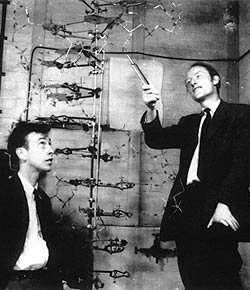DNA Structure
The structure of the DNA molecule was discovered back in 1953 by Watson and Crick, using Rosalind Franklin's x-ray crystallography data. We'll watch the movie, Race for the Double Helix, which gives you the whole story of this important discovery. I think you'll find it surprising and interesting.
Enormous strides have been made in the field of decoding the DNA of humans and other important species. When the government funded Human Genome Project started in 1990, it cost $3 billion dollars to sequence the DNA of one human and took 13 years. The project jump-started an entire industry, and may turn out to be one of the best investments humans have ever made in science. In 1998, one of the principle scientists, Craig Venter, spun off a company called Celera. Fast forward 15 years and there's a whole industry around DNA sequencing. Now you can order a $99 "spit kit" that diagnoses you for 240+ conditions, or have your own dog's DNA sequenced to learn what bloodlines he contains for $74.99. Crime scene investigators are increasingly using DNA samples to link suspects to crimes, or to clear them. Unsolved criminal investigations are being re-opened using DNA analysis of evidence collected decades ago. The Innocence Project is using DNA to reexamine evidence and sometimes free people on death row who were wrongly convicted. Rapid advances are being made in many branches of biology and medicine, including treatments for genetic defects, new methods to fight infectious diseases, the re-growth of lost limbs, organ replacement, cancer cures, and the postponement or reversal of aging.
It's not all good news however. We now have the ability to look at your DNA and determine whether you carry a genetic defect for which there may be no cure and which may, some day, kill you. If someone in your family is suffering from an incurable genetic disease, would you want to know if you're going to get it too? What if you're adopted and know nothing about your genetic legacy? Would it affect your decision to have children, or change what you plan to do with your life? Would you feel guilty if you learned that you passed down a genetic defect to your child? Thanks to recent advances in DNA sequencing, we will all have much more information about our fate in the near future, but not necessarily the ability to do much about it!
How much of who we are is a result of our environment (the way we are "nurtured") and how much is because of our genes (our "nature")? This is a fascinating topic that has deep philosophical and moral implications. One answer to the
nature-nurture question lies in studies of
identical twins raised apart (adopted out to different unrelated families). Of course, not all traits are equally "heritable." Blood type, height, and eye color are highly heritable, whereas adult weight and religiousity have only medium heritability, and specific religion practiced and specific language spoken have low heritability. For example, any person, if raised from birth in another culture, would be similarly able to speak that culture's native language since specific language spoken has low heritabiity. We are not all born equal, but we deserve to be treated as if we were. What we can achieve as humans is more than just a measure of our genetic makeup. I think the movie
Gattaca does a good job exploring this topic, and the classic novel, Brave New World, shows us how badly we could go wrong.
If you're into codebreaking puzzles, there's a new "crowdsourced" DNA sequencing game you can play online where the players compete against each other and the computer to match real DNA fragments. It's called
Phylo. Give it a try if you're curious. Maybe you'll help find a cure for a defect lurking in your own genes!
